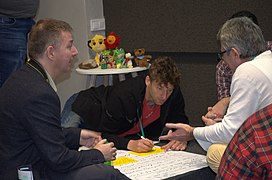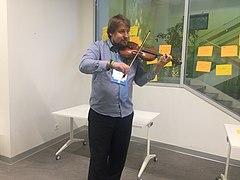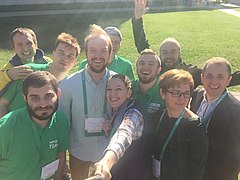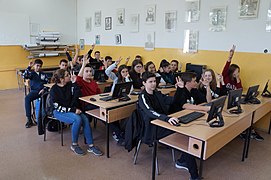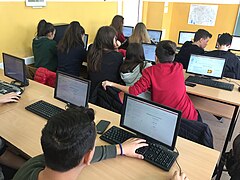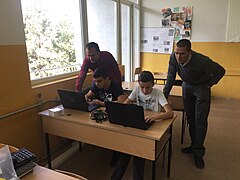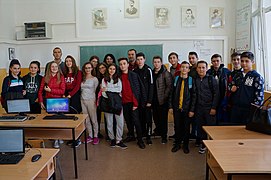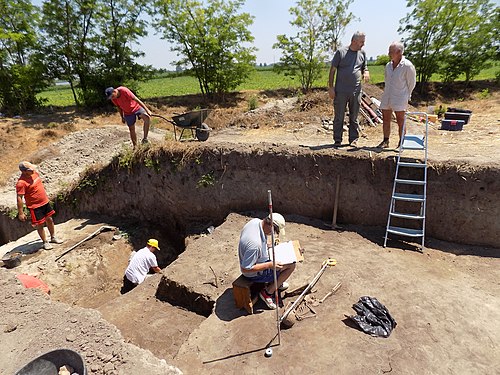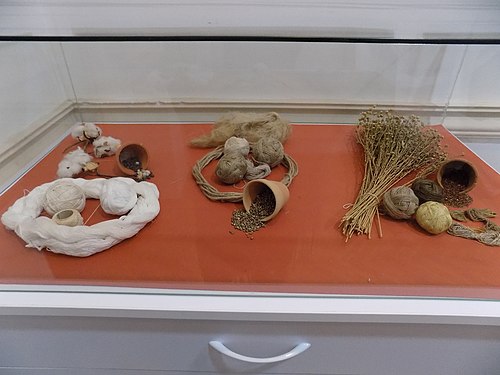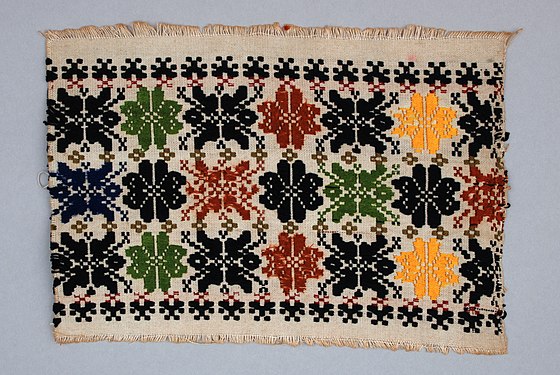CEE/Newsletter/October 2018/Full

Volume 2 • Issue 9 • October 2018
Contents • Single page view • Subscribe
Regional report
[edit]CEE Meeting 2018 was cool =)
[edit]- By ViraMotorko

CEE region has this amazing tradition to gather once a year and share everyone's experiences, and learn from each other. This year, Wikimedia Ukraine was proud to host this gathering of great wiki-minds in Lviv. Organising team was devoted to providing the best conditions for the fruitful work. If they overreacted to the task, please, forgive them: capacity building was at stake!
Statistics time: Out of 127 participants 50% attended a CEE Meeting for the first time and for 30% it was their first international event ever. Wikimedia experience of participants varied from <1 year to 17 years. Gender ratio was as follows: 38% women, 62% men. Several approved attendees, including two speakers, were not able to come in the end. Nevertheless, the representation of the communities at CEE Meeting 2018 was at a relatively high level.
Everyone is encouraged to explore the conference program (it has links to etherpads for the sessions, where you can find participants' notes) and Commons category with presentations. Also, don't be shy to check who exactly attended and ask these people questions! Sharing is caring, isn't it?
-
Preconference day: Asaf Bartov training CEE Meeting speakers
-
Wikimedia Strategy presentation
-
Focused attendees at the session
-
Work in progress with Wikimedia Cuteness Association overseeing everything
-
Sweets table, of course
-
Group work
-
Kaarel performing during the break
-
More work
-
Even more work
-
Sunny orga-selfie
More photos and other materials can be found on Wikimedia Commons in Category:Wikimedia CEE Meeting 2018.
Wiki4MediaFreedom contest - II edition
[edit]
Osservatorio Balcani e Caucaso Transeuropa has launched the II edition of the Wiki4MediaFreedom contest! You have until 30 November to participate!
Within the contest you can create e new Wikipedia articles or updated or improve existing one. You can translate existing articles or write original ones. Target languages includes several ones of Central and Eastern Europe: Albanian, German, Serbian, Croatian, and Serbo-Croatian, plus English, Italian, and Spanish. Articles must fit into the media freedom topic. You can choose from an existing list (focused on access to public information and assassinated journalists) or you can propose new articles in the talk page.
Articles will be evaluated by a jury based on quality, quantity and sources added. Winners will be awarded online gift vouchers with values ranging from EUR 50.00 to EUR 20.00. The I edition of the contest was held from May to July 2018. Italian wikipedian Kaspo won the first prize with the article "Libertà dei media in Russia" (Media freedom in Russia) on Italian Wikipedia. More information in the Meta page.
Wikidata: Train It Forward
[edit]- By Spiritia

This November, Wikimedia Österreich and Wikimedia Deutschland are conducting for the German-speaking wiki communities Wikidata trainings. What makes these training special is that they are "Train the Trainers" sessions, and this is the first time the concept is tested with German-speaking participants. The training in Vienna will be held in English and there are still some spots left:
- Date: from Friday 30.11. to Sunday 02.12, in WMAT office in Vienna (with Jens Ohlig, Julia Kirchner and Lea Lacroix)
The workshops include a variety of topics, including:
- Everything you need to know about Wikidata
- Wikidata for Wikipedians
- Talk to the public, share knowledge and moderate groups
- Documentation and evaluation
To ensure the best possible quality of training, the number of participants is limited to 12 people per session and people have to commit to the entire weekend. Participants are expected to have some experience with Wikidata, but may not need experience in conducting Wikidata workshops.
Reach out to Claudia from WMAT in case you are interested!
- See also
Albania report: Whiz Khalifa, Wiki Education and WikiPhotowalk ː)
[edit]WikiEducation
[edit]

Last week of September as part of our collaboration with American Peace Corp we were in Berat to host 2 workshops at Babe Dude Karbunara high school.
On Friday, we did a general introduction about Wiki Education, introduced the pupils with the Plant materials and learned how to edit Wikidata, since this was the first time they would contribute on Wikidata. On Saturday we started working right way in the school lab. The participants as part of the Peace Corp Project had collected materials about plants that are grown in Albania. And everything is now documented on Wikidata, and some of it on Wikipedia, as well. Most of the plants were already on Wikidata, but only in English language. They are now translated in Shqip. And five of the participants open the article on Shqip Wikipedia about a certain plant they liked. The material was checked by their English teacher Stephanie.
Everyone was working on plants but Liri (UserːCameroncan), one of the participants who was a big fan of Whiz Khalifa. He was so crazy about rap music that he had already translated all articles that he found on English Wikipedia about rappers. He convinced the whole team to put his favorite rap music in the "background". The event was about their biology school tasks and to learn more about plants. But he only came to write about Whiz Khalifa ː). After he convinced us that he had memories about all the plants in the document and seeing his passion about rap, we allowed him to write about whatever he wanted to write.
Wiki Photo walk 6&7 October
[edit]In the first week of October we organized Wiki Photo Walk in Albania. The goal of the event was to collect as many pictures as we could about panorama of different cities of Albania. The budget could allow us only 3 cities, so we were in Kruja, Durres and Tirana. Were collected 345 pictures. And the winner won a Polaroid camera.
Austria report: "#WikipediaVorOrt" – Simultaneous open house events in Austria, Germany and Switzerland
[edit]
Wikimedia Austria, Germany, and Switzerland share the support of the communities behind the German language Wikipedia and her sisters projects. While the community support has been a well coordinated effort for years, there haven't been joint efforts for outreach and newbie recruitment so far.
This year we wanted to change that and co-designed a common campaign for all three countries, promoting simultaneous local open house events in many cities across the region, where interested Wikipedia readers can meet our communities, and learn how Wikipedia & Co. work. The events were advertised with prominent banners on Wikipedia, as well as posters and flyers. The campaign was a major success - the events were packed with interested visitors from Hamburg, to Stuttgart, to Zurich. In Austria we hosted two afternoon events in Linz and Vienna with about 100 visitors in total and interested journalists from newspapers and radio. The banner achieved 587,837 page views in ten days.
Perhaps the campaign could be an interesting idea for a similar future event series between some of the CEE communities. Even without a shared language Wikipedia it is a nice way to reach out to the general public raise awareness for our work.
Croatia report: Wiki Loves Monuments
[edit]- By Fraxinus
Croatia participated in Wiki Loves Monuments for the second time in 2018. We really enjoyed contributing in this special project and plan to be part of it again in the following years.
You can see the ten best pictures here. The competition was very successful and some of the photos became Featured pictures and will be Commons:Picture of the day in the near future. The winning photo shows Big Onofrio's Fountain in Dubrovnik. We give special thanks to international users: Larisa Uhryn and Zysko serhii.
- WLM Croatia 2018 Winners
Cyprus report: First participation in a Wikimedia event!
[edit]October has been a really exciting month for us as Wikimedia Community Cyprus was represented for the first time(!) at a Wikimedia event! We participated at the Wikimedia CEE Meeting organized successfully in Lviv, Ukraine by the Wikimedia Ukraine Community. It was a very insightful experience mainly because we aspire to formally create a Wikimedia Community Group on the island and we found the presentations, working groups and workshops to be extremely helpful. Apart from the Opening Workshops “How can we work better together?” and “Wikimedia 2030 Come & Tell - what needs to change in our movement?”, some of the presentations and workshops we attended were: “Healthy Wikimedia Communities – what do they need?” by Christel Steigenberger, “Meet the AffCom” by Camelia Boban, “WikiOnTheRoad” by Matej Grochal, “Vulnerability in society: how the Wikimedia Movement can make a difference” by Mina Theofiliatou, “Wikimedia & Education: developing a framework that values our community” by Nichole Saad, “What can we learn from the feminist movement?” by Asaf Bartov, “Advancing Gender Equity report” by Christel Seigenberger, “Building an affiliate from scratch: Experiences of Wikimedia Community of the Republic of Srpska” by Ljubiša Malenica.
Apart from participating in the presentations and workshops we had the opportunity of meeting many Wikimedians coming from diverse backgrounds and form genuine bonds of cooperation and support. We aspire to stay connected with them and continue our collaboration.
Esperanto report: Wiki Loves Zamenhof/Esperanto objects for the first time
[edit]
There are some projects that just need some time to mature and be exeCuted... That was the situation of Wiki Loves ZEOs (Zamenhof/Esperanto objects) - our very first photo competition, just done several weeks ago!
During more than 1 century of its existence, Esperanto caught attention of many pioneers, idealists and visionaries, who hoped for better world, where every single human being can freely communicate with all the other people. That attention in many cases manifested in touchable artifacts spread all over the Earth and beyond, usually by name clearly showing their affiliation to the Esperanto idea or its initiator, Dr. Zamenhof (so the name ZEO, or Zamenhof/Esperanto objects).
ZEOs was in our spotlight virtually from creation of our group. But it was waiting until our activist Sahaquiel9102 took the wheel. The initial ideal to include ZEOs into Wiki Loves Monuments 2017 was rejected by the international team, because ZEOs are not necessary monuments per se. So, under Sahaquiel9102's leading, we organised our own competition in 2018 - Wiki Loves ZEOs 2018!
Thanks to a grant from WMF and additional support by the World Esperanto Association we could provide nice prizes to the winners in several categories. Beside the best photo ever, we had a category for by-gone ZEO, non-listed ZEO, user with photos most used in articles and finally, People's Choice Award measured by reactions on Facebook. Additionally, World Esperanto Association provided discount to its book service for 5 best photos on every continent.
At the end, our CEE region just rocked the competition! From the CEE are the 5 best photos, 18 out of 29 best photos and the photos with the most Facebook engagement! What the world would done without us?!
-
 Statue of Zamenhof, Lithuania
Statue of Zamenhof, Lithuania -
 Statue of Zamenhof, Lithuania
Statue of Zamenhof, Lithuania -
 Esperanto monument, Austria
Esperanto monument, Austria -
 The grave of Zamenhof, Poland
The grave of Zamenhof, Poland -
 Zamenhof monument, Austria
Zamenhof monument, Austria -
People's Choice Award, Poland
Estonia report: Estonian art and geoscience collections finding their way to Commons
[edit]Estonian artists finding their way to Wikimedia Commons
[edit]
A collaboration project between Wikimedia Eesti and the Tartu Art Museum is now over a year and a half old. Initially we largely worked on bringing various exhibitions into the wiki world, for example "Changing Tartu in Four Views" and "Peeter Allik. Cultivated Schizophrenia". More recently the focus has shifted towards working on the entire work of individual artists, so that we will cover a larger section of the museum collections.
Some of the most recent artist involved have been Julie Wilhelmine Hagen-Schwarz (1824–1902), Konrad Mägi (1878–1925), Nikolai Triik (1884–1940) and Lola Liivat (1928–). As you can see, we've been both working on those artists who died long enough ago for their work to be in the public domain, and those who are still among us and are able to give us their permission to document their artworks.
Additionally, almost all the works from both the painting and the watercolor collections of the Tartu Art Museum have been documented in as much depth as possible in Wikidata. This part of the project has already been extended to the collections of other Estonian museums, with whom we plan to also reach a deeper collaboration including image sharing and uploading in the future.
Geoscience Collections of Estonia moving closer to Wikipedia
[edit]
October marked the beginning of our cooperation with the Estonian Museum of Natural History to bring the images of their geological collection into Wikimedia Commons. The first (manual) upload can be seen on this report, and the plan is to follow the same format while adding images automatically in the future, until the entire collection of several thousand images has been made available to everyone.
Greece report: Workshops and contests
[edit]Outreach activities
[edit]- By Geraki

- Wikipedia Lab @ Thessaloniki
- More than 35 people attended the Wikipedia Lab workshop, a three hour course organized by the Wikimedia Community User Group Greece in cooperation with Goethe-Institut in Thessaloniki. The scope was to introduce and deepen the contributions to Wikipedia while introducing Wikipedia's fellow projects, such as Wikimedia Commons and Wikidata. The workshop format included on-the-spot demonstration and practice of using the Wikipedia editing environment and all related functions.
- WLM/WLE/Tech contests
- 2nd Article Creation contest on Computers and Technology. The prizes were free tickets for attending Voxxed Days and were given to female users. (WM UG GR)
- Contest on adding photos from Wiki Loves Earth 2018. 351 images from WLE were used on Wikipedia, Wikidata etc. (WM UG GR)
- Wiki Loves Monuments in Greece run for the third time with great success. 4506 were uploaded by 283 uploaders, 81% of them being new users. (WM UG GR)
Wikipedia submission to International Conference: Digital School for Educators
[edit]
- By Geraki and Marios Magioladitis
Konstantinos Stamboulis and Marios Magioladitis presented the paper "Digital Wikipedia School for Educators" as part of the 4th International Conference on the Promotion of Educational Innovation. The paper presented the way they organized the Wikipedia for Teachers online course, the syllabus, curriculum and their conclusions from the operation of a digital school for teachers of all grades, which lasted 8 weeks.
Wikipedia has previously been proposed as a good practice both as a project and as a cross-domain object. The digital school aimed to educate Greek teachers of all levels and familiarizing them with the Wikipedia Education Program by proposing new ideas for project plans based on Wikipedia and its fellow projects that could potentially be applied to schools of all levels or even in university-level workshops.
As a training platform, the Digital School was built in a website that was created using the popular Wordpress software, which is mainly used to create blogs but it is also used to run major websites from large organizations around the world. In order to transform it in an educational platform, the Learnpress plug-in was installed, which allows the creation of training programs that include course modules and lessons. The courses prepared included the following elements:
- Links to existing Wikipedia's instructions, help, and policies
- Explanatory videos created specifically for our educational program with technical guidelines for the environment and the operation of Wikipedia
- Videos from the Wikipedia in Education series created by the Wikimedia Foundation, subtitled in Greek
- Texts of relevant papers presented at educational conferences in Greece, on the use of Wikipedia as an educational tool at various education levels
- Real-time online courses via Skype/YouTube platform.
The submission in the International Conference caught the attention of many educators and received positive opinions from the audience.
Macedonia report
[edit]Start of the new school year with the education program in three schools in Macedonia
[edit]- By Македонец
Education program in Macedonia in this year has seen a significant expansion in three schools in Macedonia out of which in two primary schools have just been started in this year. This month we have started the education program in a new third school of "Goce Delčev" in the town of Negotino in south-central part of Macedonia.
- Krume Kepeski Primary School in Skopje
Оn 17th of October we have started the new educational program in the Krume Kepeski primary school, which have been set up for the first time in February 2018. With the help and support of the history teacher and our coordinator for the program in this school Slobodan Trajkovski we have prepared several months activity plan and program which will be implemented throughout the entire school year of 2018/2019 with the students of the ninth grade on the subject "Introduction of Homeland" including a specific editing and learning activity every month in the school classroom as well as out door visits. The first introductory class was held with the students of three different classes of ninth grade who attend the optional subject of "Introduction of Homeland". On this introductory lecture 18 students have created user accounts and 17 new short articles about Rivers in Macedonia and 1 improved with text for a village in western Macedonia, with main aim to be introduced and get acknowledged with Wikipedia and the ways of creating and editing articles and adding content. Some of the students have shown significant editing skills as they have already known about working on computer, programming and Wikipedia, while with few of them edits of the articles were made through the mobile application of Wikipedia. The work will continue through the tasks and homework given by the teacher that will be done and added on Wikipedia and the lecture in the next month.
- Goce Delčev Primary School in Negotino
In the new school year of 2018/2019 the education program has been extended to another new primary school "Goce Delchev" in the town of Negotino in south-central part of Macedonia. The entire program collaboration and event organization was conducted by our longstanding contributor on the Macedonian Wikipedia Elizabeta Trpkovska (User:BlueEagle1) who is a teacher of French language at this school and show a great interest and initiative for education activities of Wikipedia within the education program in her school. Early in the day a memorandum of cooperation has been signed with the school's principal Petar Mantev who together with our education program coordinator for this school Elizabeta Trpkovska and other colleagues have shown a great interest, initiative and readiness for implementing education activities of Wikipedia within the education program in the school throughout this and the next school years. Upon the great organizational efforts of Elizabeta Trpkovska who have previously chosen 20 interested students from different classes of ninth and eight grade, the school provided a classroom with 14 desktop computers whit quite decent internet connection where the first lecture and editing activities took place for a period of more than and hour and a half. At the class the students have been instructed of the basics of editing with adding texts, citations, adding hyperlinks and categorizing the created articles for archaeological sites in Negotino region, while few students who have shown greater and more advanced skills have also been introduced to the translation tool. The activity have successfully been finished with significant outcome of 40 newly created articles by the students.
- Josip Broz Tito High School in Skopje
On 30th of October we have started the educational program in Josip Broz Tito high school for the fourth consecutive year. This first activity in the new school year included initial teaching class for editing and working on Wikipedia with students from the fourth year. In a period of one hour upon already given topics from physics by their teacher Cvetko Nedelkovski six students have participated the class editing 10 articles in total out of which 9 newly created and 1 largely improved article. All of the students have edited their first article by coding editor while their second and other articles have been created through the translation tool which has also been presented to them on this occasion. Editing activities within the education program in Josip Broz Tito high school have started few days earlier in the second half of October as the teacher Cvetko Nedelkovski gave homework assignments for the students to create articles on Wikipedia in physics topics. Thus the total number of participants and edited articles so far is 21 students who have created 23 and improved 2 articles. The students will continue with further editing and improving articles as a tasks given by their physics teacher within their regular assignments.
GLAM Macedonia activities in Education and GLAM
[edit]- By Violetova
Wiki Camp Doyran 2018
[edit]Wiki Camp Doyran 2018 took place on the weekend of 7-9 September 2018, in Doyran, Republic of Macedonia. The Camp was a successfully and professionally organized camp for underage students for editing articles on Macedonian Wikipedia. Overall, the camp was a huge success regarding the stated goals and expected outcomes. We had 56 participants, 46 students, two lecturers, and others were involved teachers and GLAM Macedonia volunteers. The students were coming from 10 schools, all from different cities. As a direct result of the Camp one Wiki section was started and 300 new articles were created. On the Wiki Camp, there were 28 already trained Wikipedians, who are members of Wiki Clubs in Macedonia, and 18 newbies.
The sessions were split first two days: in one group there were the new users who were trained to edit Wikipedia and in the other group were Wikipedians who created articles and learn more skills while editing. The second day, there were two sessions: one workshop for photography, and the second workshop for advanced editing. The third day, after the morning editing together, the most successful editors were awarded, and we all together went back home.
- Official web page
- Project page on mk.wiki
- All photos from the event are in this category
-
Logo of the Wiki Camp
-
Part of the participants
-
Participants of Wiki Camp Doyran 2018
-
Ready for workshop
-
Editing together
-
Workshop for photography
-
Free activities
-
Giving interview for local radio
Wiki Clubs activities
[edit]
We have a new timing for regular meetings in the Wiki Club in Museum of Macedonian struggle in Skopje, and our fourth Wiki Club was established in Štip. We have collaboration with more than 20 schools in the Republic of Macedonia.
On 28 September 2018, the fourth Wiki Club was established in Štip, with coordinator Jovanka Šaleva. Organized in two sessions, the 22 students were trained for editing Wikipedia, and 6 new articles were created as a result. The same day, memorandum for collaboration was signed with the school "Kole Nehtenin".
Wiki Tour in the Archaeological Museum
[edit]

On 28 of September 2018 we organize Wiki Tour in the Archaeological Museum of Macedonia in Skopje, as a result of upcoming collaboration. Wikipedians, members of GLAM Macedonia and our friends had an opportunity to learn more about this Museum and to walk around the artifacts.
On 24 October we organized workshop in the honor of Hungarian National day - 23 October. The event took place in the office of the Association of Hungarians in the Republic of Macedonia, and all participants were members of Wiki Club in the Museum of Macedonian struggle in Skopje. During the three hours of the editing workshop, 14 new articles on Wikipedia were created, all biographies of people who were involved in the Hungarian Revolution from 1956. Bilingual book and certificates were given to the participants.
On 25 October 2018 the Agreement for collaboration was signed with the Archaeological Museum of the Republic of Macedonia. We expected with this collaboration to enrich Wikipedia with a lot of files, new articles and improved ones.
Poland report: Celebrating 100 years of Polish independence with Wikipedia
[edit]- By Magalia and Agnieszka Marszał

This year marks the 100 anniversary of Polish independence. It is widely celebrated by many organizations, culture institutes, universities. And by Polish Wikipedia! We do want to celebrate it the way Wikipedians do - by adding valuable content and bringing knowledge about most important Poland-related topics to our readers. This is why Wikimedia Polska organizes Free Poland - Free Knowledge writing contest which will help in improving the quality of articles about polish history, culture, nature, etc. Contestants - working individually or in small teams - will be allowed to choose from a list of almost 1500 Poland-related articles considered by plwiki community as the most important. The contest will end November 30th. Then the external jury consisting of Polish artists, journalists and scientists will choose up to three best articles. Their authors will receive tickets to cultural events of their choice and a selection of Polish e-books from Polish Wikisource. The winners will be announced in January 2019.
As for today already work on 6 articles has been finished and 28 more articles are marked as being worked on.
The contest is held in partnership with Wrocław University, the National Museum in Warsaw, the Independence Museum, the National Museum in Kielce, the National Museum in Szczecin and the National Digital Archives.
Romania & Moldova report: Engines running faster
[edit]- By Gikü
Bring the cake
[edit]
We've had our first ever conference!
It's true: on September 29th, Wikimedians from Romania and Moldova, as well as guests from neighboring countries, gathered in Bucharest to celebrate 15 years of Romanian Wikipedia. During the day, we sat and discussed current issues, reminisced on how it all went, and planned lots of projects for the future. Our guests were representatives of neighboring chapters, as well as Asaf Bartov from WMF and Liam Wyatt from Europeana – all of whom loaded with a ton of experience and ready to share with us. Closer to the end, we also had two Romanian NGOs reporting on their own activities, as well as the copyright shenanigans happening in the European Parliament lately.
Of course we had to have a cake! While socializing during the dinner and the lunch the second day, we managed to lay the path for improvements in the community of Romanian Wikipedia. The atmosphere is not of the most welcoming there, and we seem to have a lower than average ratio of Wikimedians per language speakers. So, doubling down on conflict resolution and new user adoption is what we'll be doing on a priority basis the next months.
Nice to CEE all of you again!
[edit]
Romanian Wikipedia was represented at the 2018 CEE Meeting in Lviv by 4 users: Macreanu Iulian, CEllen, Gikü, and Zelialex. They were not the only Romanian speaking people at the conference: among the attendees were Camelia.boban, who lives in Italy and runs the WikiDonne User Group, as well as Visem, Marcmiquel and Comp1089, who learned the language as a hobby.
The main thing we had to share was a session called Targeted projects - an effective tool for attracting new editors. WMROMD experience. In the Romanian Wikipedia and its sister projects we are running a concept of edit-a-thons dubbed 'targeted/tailored projects'. The secret is to develop a quite rigid model of work: starting from the schedule ending with the format of an article. The model works well for small communities where the volunteers do not have much time at hand for offline activities, and the rigid model helps to handle relatively large amounts of articles / material. Check out the presentation, we bet you'll appreciate the swimming pool analogy on page 13, and you'll recognize yourself in that image in some role! ;)
Among other things, we confirmed our participation in CEE Spring 2019, and participated with input on how to improve the contest. We met the one and only Farkhad Fatkulin, the 2018 Wikimedian of the Year, who is always open to help small communities with ideas and support and did so with us. We looked into German Wikipedia's studies on new editor retention, and, by participating in the associated brainstorming act, were able to identify factors that could help us on rowiki be better with welcoming new users. Finally, we did an exchange of opinions and experience with our Slovenian colleagues on why sometimes projects do not work, and how to be ready to not get discourajed by it.
More projects, more people
[edit]
Now, it may all be subjective, but there seems to be a revival in the Romanian Wikipedia community. Take Moldova: thanks to the Romanian conference in September, two retired Wikimedians made a comeback (Tolea93 and Octavix), and a new user (NicolaS961) got really encouraged and started writing more articles more frequently. And he even accepted to take part in organizing Wikipedia Asian Month in Romanian!
By the way, this year we are organizing Wikipedia Asian Month for the first time on Romanian Wikipedia :P
The offline edit-a-thons, the ones we like to call 'tailored projects', are organized more frequently as well. In the first days of November, phase two of our project to "celebrate 100 Years from the formation of Greater Romania" starts. Our first partnership programs are under way. A joint edit-a-thon with the Romanian Institute of Heritage, associated with WLM Romania, was organized in October, with perspectives to enlarge the areas of collaboration. Near the same time, a museum in Northern Romania trolled Romanian Wikipedia on Facebook, stating that our article on Museum is far worse than the English one. The result? A long chain of emails with them agreeing to partner with us in digitalizing parts of their collection!
I guess you could say... engines are running faster and faster in the Romanian Wikimedia community now.
Russia report: Wikimedians of Russia reporting about own participation @ CEEM2018
[edit]- By Frhdkazan
This is English translation of a multilingual report from Russian Wikinews

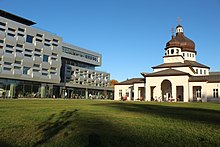
On the 13-15th October 2018, Ukrainian city of Lviv hosted Wikimedia CEE Meeting 2018. This year's conference of Wikimedians from Central and Eastern Europe region was 7th in a row, and 2nd in Ukraine. Main events were taking place at the Ukrainian Catholic University's center named after metropolitan bishop Andrey Sheptytsky. The conference program contained various presentations, thematic round-table discussions, lightning talks, trainings & workshops, informal meetings, opening and closing ceremonies, as well as the tour of the city. The conference brought 127 delegates from over 30 countries.
Pre-conference program on the 12th of October featuring trainings by Asaf Bartov was organized at the «Communa» co-work in the downtown, whilst on the 16th and 17th of October Wikimedia Ukraine's local organizing team volunteers offered Wiki-trips to Carpathian Mountains and the city of Vinnytsia.
Wiki-conference's participants were using any opportunity for in-person discussions of variety of topics to the point that some could even be found in the cafes and restaurants around the hotel in the early hours of the morning. The diversity of languages used in the process forced Viktor Semeniuk of the organizer's team to admit he hardly believes this is indeed taking place in Ukraine.
Russian Federation delegation at this annual regional forum consisted of nine Wikimedians:
- Denis Kaftajev (Wikimedians of Erzya language User Group, Voronezh)
- Dmitry Rozhkov (Wikimedia Russia, Moscow)
- Dmitry Zhukov (Wikimedia Russia, Moscow & Don Wikimedians User Group, Rostov-on-Don)
- Farkhad Fatkullin (Wikimedia Languages of Russia Community, Wikimedia Russia, Wikimedian of the Year 2018 and Wikimedians of Tatar Language User Group, Kazan)
- Saria Kagarmanova (Wikimedians of Bashkortostan User Group, Beloretsk)
- Tatiana Sviatkina (Wikimedians of Erzya language User Group, St.Petersburg)
- Viačeslav Černev (Bashkir Wikipedia bureaucrat, originally from Orenburg, last 4 years in Warsaw).
- Vladimir Medeyko (Wikimedia Russia director, St.Petersburg)
- Zaytuna Nigamatyanova (Wikimedians of Bashkortostan User Group, Shamonino)
In the course of the event, Russians made 5 official & 2 additional lightning talks (under 5 minutes: Denis, Dmitry Zhukov, Farkhad, Tatiana, Viačeslav, Zaytuna) and two full-scale presentations — on Open Library and Open Heritage projects by Vladimir and Dmitry Rozhkov, as well as Wikipedias in the languages of Russia: Growing multilingualism online by Farkhad.
Principle working language of the conference was English, but in the course of contributions by the Wikimedians from Russia one could also hear Bashkir, Russian and Tatar (in Farkhad's interpretation), as well as Erzya (interpreted by Tatyana). In the course of Asaf's pre-conference trainings, opening & closing ceremonies, a few plenary sessions and working groups, as well as downtown Lviv guided tour on the 15th of October, Farkhad was interpreting into Russian and Tatar (the latter being very close to the mother tongue of Bashkir Wiki-grandmas, who now have an international fan-club).

The audience was impressed by the amount of on & off-wiki organizing activities conducted by Wikimedians of Russia without any grant support from the Wikimedia Foundation and their achievements in promoting Wikimedia movement in the regions of Russia. International colleagues recommended to bring forth Russia's Wiki-multilingualism, reporting on Wikimedia projects in the languages of Russia and their communities at the Annual Celtic Knot Conference about Wikipedia language (UK: 2017, 2018). Russia's Wikimedians were also invited to take active part in the ongoing English-speaking discussions of Wikimedia movement strategy, which beginning now would be the focus of the Annual Spring Wikimedia Conference in Berlin (2019 event will bring together one representative from every affiliate that meets annual reporting requirements as of 1 December 2018).
All photo and video materials of the event will eventually be available at the dedicated category on Commons. Video of livecasts from the the main hall, as well as sessions in Auditorium 1 might also be seen on YouTube. Closing ceremony recording is available at Wikimedia.Ukraina@Facebook (20:00-32:30)
-
Asaf Bartov's presentation «COMMUNA» cowork. Dmitry Zhukov listening to Farkhad's interpretation into Russian, sitting by the table on the left.
-
Bashir Wikipedia bureaucrat Viačeslav Černev.
-
Dmitry Zhukov at work.
-
Zaytuna's lightning talk in Bashkir being interpreted into English.
-
Vladimir Medeyko on Open Library and Open Heritage projects.
-
Large hall.
-
Farkhad interpreting into Tatar for Bashkir Wiki-grandma's delegates: Saria (left, red hair) and Zaytuna (right, green sleeves).
-
Denis Kaftajev (back right, white T-shirt).
-
Group photo.
-
Local organizers' team.
Serbia report: New GLAM partners attracted and Appreciation from the Ministry of Culture and Information
[edit]Certificate of Appreciation for GLAM in Serbia
[edit]On October 3rd, Wikimedia Serbia was awarded by the Serbian Ministry of Culture and Information with The Certificate of Appreciation for the contribution in the process of digitization of cultural heritage.
The Minister of Culture and Information Vladan Vukosavljević presented the certificate to the WMRS GLAM coordinator Ivana Guslarević, during the Ceremony at the National Museum in Belgrade, organized on the occasion of releasing of the new Rulebook on Detailed Conditions for the Digitization of Cultural Heritage. The Minister presented his gratitude to the state authorities, institutions, companies, educational institutions and individuals who helped in digitization.
Wikimedia Serbia, through strong partnership and cooperation with the Sector for the Development of Digital Research Infrastructure in the Field of Culture and Art under the Ministry of Culture and Information, has achieved significant results over the past year in terms of digitization and presentation of cultural heritage on Wikipedia and other wiki projects.
Due to technical difficulties, we are re-posting our September contribution for the readers:
Serbian Wikipedia enriched by another museum’s heritage
[edit]During August and September, the Wikipedian in Residence program took place in the Museum of Vrbas, which opened its door for an enthusiastic Wikipedian, in order to help her increase free content online based on the sources stored in this museum. The culture and history of the city of Vrbas, as well as the museum itself, are now represented on Serbian Wikipedia through 25 new and 7 improved articles, but also with almost 350 free images for wiki projects.
Cooperation between Wikimedia Serbia and the City Museum of Vrbas was encouraged by the Ministry of Culture and Information, with the initial support provided to the Wikimedia GLAM Program. After the representatives of the Museum of Vojvodina attended the first seminar at the Ministry, this provincial museum initiated the organizing of another GLAM seminar. The historian and curator Pavle Orbović, one of the most valuable participants in this seminar, was delegated to this two-day activity by the Vrbas City Museum. He quickly and easily mastered the basics of editing Wikipedia, but, more importantly, the importance of the presence of the institutions in Wikipedia, as well as the mission of spreading free knowledge about cultural heritage.
Wikipedian Oksana Mudri-Nedić worked for a month at the museum, uploaded images, wrote, improved and illustrated articles, but she says that all employees had given her immense help, and their enthusiasm and commitment to this project gave her even greater incentive to record the history of Vrbas.
Internship programs have been intensified this year and, after successful internship at the Museum of Yugoslavia, currently has a two-month internship at the Museum of Vojvodina, financed by the Ministry of Culture and Information of the Republic of Serbia.
The Museum of Vojvodinian Slovaks became a part of the global GLAM program
[edit]The Museum of Vojvodinian Slovaks in Serbian city of Bački Petrovac became the newest partner of the global GLAM project (Galleries, Libraries, Archives, Museums) that aims to represent cultural and historical heritage on Wikipedia. With the help of an experienced Wikipedia editor and a GLAM volunteer from Wikimedia Serbia, this museum released 65 photographs for wiki projects in just five days.
The partnership was a result of the support of the Ministry of Culture and Information of the Republic of Serbia and was initiated on a seminar in the Museum of Vojvodina which took place back in April. Director of the Museum of Vojvodinian Slovaks, Anka Seč-Pinćir attended the seminar and realized the potential of the presence of the museum’s collections on Wikipedia and helped organize the partnership.
|
It is important that the workers in cultural institutions understand that they need to share information |
"The partnership with Wikimedia started spontaneously. I met the representatives of Wikimedia Serbia during a workshop in the Museum of Vojvodina where I got the thorough and useful information. Because the people were very open and professional and because Wikimedia is a global organization that stands behind many enormous online projects, we were happy to work together. So we planned the “introduction” to a partnership that will last for years. Soon after we started a 5 day project. The Wikipedian that stayed with us added information about our institution; more specifically he edited articles, uploaded photos of the items in the museum, old photos and paintings from the museum’s collections. Aside from that he went around Bački Petrovac and Kulpin where he also took photos of various sites, specific places and the environment." Anka Seč-Pinćir, Museum of Vojvodinian Slovaks |
Because this museum doesn’t have enough employees who would dedicate their time for the selection of the materials (and the metadata that goes with them) and their publishing on Wikimedia Commons, Wikimedia Serbia sent a GLAM volunteer to Bački Petrovac so that a part of this job would be done efficiently. That's how Miloš Todorović, a former Wikipedian in residence and devoted GLAM volunteer, spent five days in this place in Vojvodina. In addition to uploading photos released by the museum, Miloš took 92 photos of cultural monuments and other sites in Bački Petrovac and Kulpin.
These results with such a narrow time limit show that the global GLAM project has another partner eager for a long-term collaboration that will further present the culture and history of Slovaks in Serbia on wiki projects.
Slovakia report: WikiOnTheRoad
[edit]- By Jetam2

In the summer, Wikimedians of Slovakia started their project WikiOnTheRoad. It continues until November. As part of this project, we visit cities in the regions of Slovakia with the goal of meeting our contributors and teaching new ones as well as creating Commons content.
Slovenia report: Wikimedia projects in education
[edit]- By Miran Hladnik (also User:Mhladnik)
I've just returned from the Wikimedia CEE Meeting 2018 in Lviv, which stimulated me to write this report; I should have done it before and present it already in Lviv.
Slovene Wikimedians haven't tried yet to establish their own User Group or Chapter.[1] Slovene Wikipedia (Slovene Wikipedija, prosta enciklopedija) appeared in 2002 and contains approximately 162.500 articles at the moment, ranking 45th considering this number, 43rd considering active users. 22nd regarding the number of documents digitized, 9th regarding the number of users at Wikisource (Slovene Wikivir), 14th on Wikiversity (Wikiverza) and 53rd on Wikibooks (Wikiknjige). At the moment, 16 active administrators along with 350 active users keep things running on the Slovene Wikipedia. It is not bad at all for the total of 2 million Slovene language speakers.
It seems Wikiversity and Wikisource are the specificity of the Slovene Wikimedian's activities. As I am an admin at the Slovene Wikiversity and Wikisource projects I am going to limit my report on these two projects. I am a Slovene literature professor at the University of Ljubljana and I started the first school project in 2006 (see the report about it in Slovene student projects in Wikipedia and Wikisource), writing entries on Slovene literary historians. Later the use of Wikimedia projects in class became a daily necessity. Some colleagues at my department and some from other educational institutions (Pedagogical faculty, Humanities at the University of Nova Gorica, grammar school philosophy teachers) followed the example, however far from describing this endeavour as common. Nevertheless, I organise wikiworkshops for teachers and spread the wiki message wherever possible (Wikipedija live), teachers prefer to stick to commercial educational platforms instead.
Slovene Wikiversity starts with the list of subject pages, predominantly for Slovene literature subjects. Students enrol into the seminar schedule, they create their personal portfolios and summarize their readings and experience. They build their personal dictionary of the new words they have encountered. Students document their activities on their Wikiversity userpages, they report about their assignments and exchange information with teachers and others. The students who exceed the expectations, get a smiley or another sign of my admiration, adjacent to their names on the list. Teachers publish links to their educational resources and instructions. There are additional task lists for those who want to achieve a higher grade and for those who want to compensate their absence. It is very important that the teacher or the assistant regularly check their work, correct it and comment.
We use Wikiversity as a sandbox to sketch encyclopedic entries for Wikipedia. From the standpoint of traditional school, the weak point of Wikiversity is grading. Wikiversity as an open platform doesn't allow »publishing« students' grades. On the other hand, after GDPR, Wikiversity has become one of a few platforms where students' names appear at all, because it enables the students to put down their names adjacent to the assessment list by themselves. No, I haven't experienced anything bad using Wikiversity in class, disregarding one or two minor vandalisms. More than 100 students finish their assignments on Wikiversity, resulting in Wikipedia articles or Wikisource texts, each year.
We use Wikiversity for research projects and pre-publications of academic papers as well. Among projects Slovene partisan monuments at Geopedia (Geopedia is an open map where users can add their layers) deserves special attention. The project's page at Wikiversity brings the description of the project, literature to use, hints, publications in the frames of the project, a counter of entries, etc. 3400 monuments have been already mapped and described by some 30 volunteers.
On the Slovene Wikiversity you can also find a list of hundreds of diplomas from the Slovene studies field, with links to the full texts uploaded elsewhere. This is because the University repository wasn't ready to accept them, though it should be obligatory for every diploma or master's degree.
Freshmen (and freshwomen :) begin their serious work on Wikisource, which is the place where they upload literary texts found in the national digital library, correct the mistakes, caused by OCR, and equip the texts with metadata and categories. Everybody is supposed to write her name (my students are predominantly female) on the assignment list with short literary texts published in newspapers that are already in public domain. It is hard to say how much of the total of public domain literature in Slovene language has been already put onto Wikisource, though our plan is to include all of it. What is considered classics (be it for school, anthologies or popular classics), is already there. Tens of diplomas bring excerpts of the literature published in the old newspapers and publish them on Wikisource.
I'd like the students to accept Wikiversity as their »academic facebook«, however, only about 10 % of them continue using wikis on a voluntary basis. They enter the student project Slovene classics on Wikisource, which I lead and which has been financed by the Ministry of culture already for ten years. Every year, 20 students or so edit more than 100 lengthy works consisting of at least 2 million words on Wikisource and thus earn some money for Summer holidays.
Wikipedia. In the second class I start lessons checking the today's date on Wikipedia: who of the writers was born or who died on that day, what happened that day and it is somehow connected with literature.
The students write all possilbe articles on Wikipedia: in the first year everyone in the class is supposed to encyclopedize one Slovene novel: a short introductory description, metadata in the infobox (also reprints, translations, film adaptations, awards), a plot, criticism, literature used, categories. In the following years biographical articles follow and articles about the topics colored red among the links. The exchange students from abroad translate and localise Slovene entries for their local Wikipedias. Over the last two years, the lists of locally important persons have proved to be interesting for students, everyone in the class covering his own community.
Personally, I discovered Wikibooks to be very useful for my publication plans. I've written the vademecum Nova pisarija (New scripture) as a textbook for freshmen on how to write and behave on the Web. The students are encouraged to correct eventual typos in the book or comment the ideas expressed. And I am composing the local history as another Wikibook: Dobrave, the chronical of the village, which brings me a lot of pleasure.
I am convinced that Wikimedia projects with ther basic principles (cooperation, counter-authoritarian attitude, openness, sharing principle etc.) are an important vehicle for the cultural paradigm shift. They sweep with cultural pessimism and open promising social aspirations. Concerning the educational system, wikis force the users to exit the school ghetto and enter the realm of their discipline through the participatory establishing its sustainable digital infrastructure. Wikis make the students do their assessments not to satisfy the teacher's on parents' expectation, but to satisfy the cultural needs of the society, thus making them more responsible. I regard the University as an incubator or a social lab, where alternative forms of social existence are tested, instead of chewing and recycling the old-fashioned cultural values. Who else could write Wikipedia articles better than students, in the world where their teachers avoid this task, because it doesn't help them climb on the academic ladders. Let me express my belief that writing Wikipedia entries should be taken into the account in the evaluation of academic careers.
Conclusion. Considering the valuable potential of wikis in the paradigm shift in which competition retreats, while participating and sharing win, wikis are alas insufficiently represented in education, as in Slovenia as in other countries. How to raise public awareness about the cultural importance of wikis for the necessary radical change of our worldview? How to convince our colleagues to join? How to achieve that wikis become a students' daily working environment and not only one of the educational tools? Please, help with suggestions.
Turkey report: Wikidata's Birthday celebrated in Istanbul
[edit]- By Basak
This year, Wikidata's birthday was celebrated in Istanbul for the first time. An event was held in Uskudar University, Istanbul, for the sixth birthday of Wikidata. It was organized with the collaboration of Wikimedia Community User Group Turkey (WMTR) and Bilim Ofisi (student club on science). We were very happy to have Andy Mabbett from Birmingham as a guest speaker to make a presentation on Wikidata and introduce the audience to the project.
Before Andy's presentation WMTR members had a presentation about Wikimedia projects and had a chance to answer the questions of the students. Most of the audience consisted of students of the Computer Sciences department and their instructors. We are so happy from the interest of the students and to be able to have a chance to talk them about our user group activities and Education Program.
At the end of the presentations of course we enjoyed the birthday cake!
-
Waitig the audience
-
Andy Mabbett's presentation
-
WMTR members answering the questions
-
We are having the cake
- ↑ Meanwhile, the proposal for establishing the Slovenian User Group has been sent to the Affiliations Committee.




